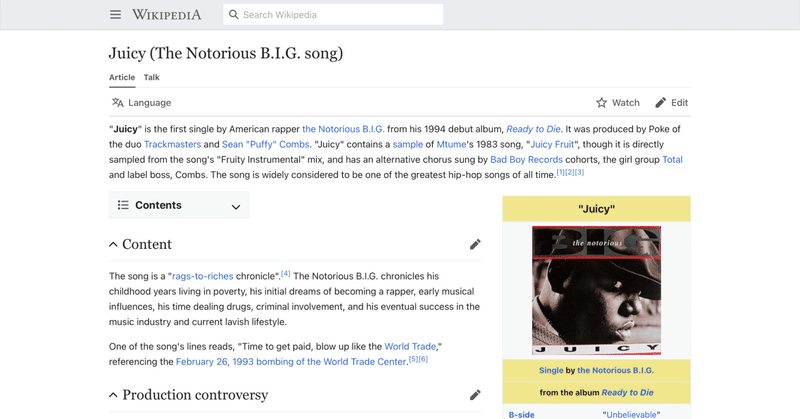
【ノトーリアスB.I.G.|Juicy】英語版ウィキペディアを読む【The Notorious B.I.G.|Juicy】
概要
”Juicy” is the first single by American rapper the Notorious B.I.G. from his 1994 debut album, Ready to Die.
「Juicy」は、アメリカのラッパー、ノトーリアスB.I.G.の1994年のデビューアルバム『Ready to Die』からのファーストシングルである。
It was produced by Poke of the duo Trackmasters and Sean ”Puffy” Combs.
プロデュースはTrackmastersとSean ”Puffy” CombsのデュオのPokeが担当した。
”Juicy” contains a sample of Mtume's 1983 song, ”Juicy Fruit”, though it is directly sampled from the song's ”Fruity Instrumental” mix, and has an alternative chorus sung by Bad Boy Records cohorts, the girl group Total and label boss, Combs.
「Juicy」は、Mtumeの1983年の曲 ”Juicy Fruit ”のサンプルを含んでいるが、この曲の「Fruity Instrumental」ミックスから直接サンプリングされ、Bad Boy Recordsの仲間であるガールグループTotalとレーベルのボス、Combsが歌う代替コーラスが使われている。
The song is widely considered to be one of the greatest hip-hop songs of all time.
この曲は、ヒップホップの名曲として広く知られている。
Content(コンテンツ)
The song is a ”rags-to-riches chronicle”.
この曲は「ボロ負けクロニクル」である。
The Notorious B.I.G. chronicles his childhood years living in poverty, his initial dreams of becoming a rapper, early musical influences, his time dealing drugs, criminal involvement, and his eventual success in the music industry and current lavish lifestyle.
貧困にあえぐ幼少期、ラッパーになることを夢見ていた時期、影響を受けた音楽、ドラッグの売買、犯罪への関与、そして音楽業界での成功、現在の贅沢なライフスタイルが描かれている。
One of the song's lines reads, ”Time to get paid, blow up like the World Trade,” referencing the February 26, 1993 bombing of the World Trade Center.
この曲のセリフのひとつに「Time to get paid, blow up like the World Trade」とあるが、これは1993年2月26日に起きた世界貿易センタービル爆破事件を指している。
Production controversy(制作上の問題点)
Producer Pete Rock alleged that Puffy stole the idea for the original song's beat after hearing it at Rock's house.
プロデューサーのピート・ロックは、パフィーがロックの家で原曲のビートのアイデアを聞いて盗んだと主張した。
In an interview with Wax Poetics, he said: I did the original version, didn't get credit for it. They came to my house, heard the beat going on the drum machine, it's the same story. You come downstairs at my crib, you hear music. He heard that shit and the next thing you know it comes out. They had me do a remix, but I tell people, and I will fight it to the end, that I did the original version of that. I'm not mad at anybody, I just want the correct credit.
Wax Poeticsのインタビューで、彼はこう語っている。「オリジナル・バージョンは俺が作ったんだけど、クレジットされなかったんだ。彼らは僕の家に来て、ドラムマシンのビートを聴いたんだ。俺の家に来て、ドラムマシンのビートを聞いた。彼はそのクソを聞いて、次の瞬間にはそれが出てきたんだ。リミックスを作らされたけど、俺はみんなに、最後まで戦うつもりだけど、あれは俺がオリジナル・バージョンを作ったんだと言っているんだ。俺は誰にも怒っていない、ただ正しいクレジットが欲しいだけなんだ。」
Pete Rock's remix of ”Juicy” uses the same sample as the original.
ピート・ロックのリミックス「Juicy」は、オリジナルと同じサンプルを使用している。
During an appearance on the Juan Epstein Podcast, Rock said that he has no hard feelings about how ”Juicy” came about, but wished he had gotten the proper credit, although he did admit to harboring some ill feelings at the time.
Juan Epstein Podcastに出演した際、ロックは「Juicy」が生まれた経緯に恨みはないが、当時は悪感情を抱いていたことは認めつつも、きちんと謝意を示してほしかったと語っている。
Biggie appeared in the ”Unsigned Hype” column of the March 1992 issue of The Source as ”The Notorious B-I-G,” and he was also listed as ”The Notorious B.I.G.” on a 1992 single by Neneh Cherry when he was signed to Uptown/MCA.
ビギーはThe Source誌1992年3月号の「Unsigned Hype」欄に「The Notorious B-I-G」として登場し、Uptown/MCAと契約していた1992年のNeneh Cherryのシングルにも「The Notorious B.I.G」として記載された。
Aside from sharing the same sample source, both songs share little in common otherwise, most notably in regards to subject matter.
サンプルソースが同じであることを除けば、両曲の共通点はほとんどなく、特に題材についてである。
この記事が気に入ったらサポートをしてみませんか?
